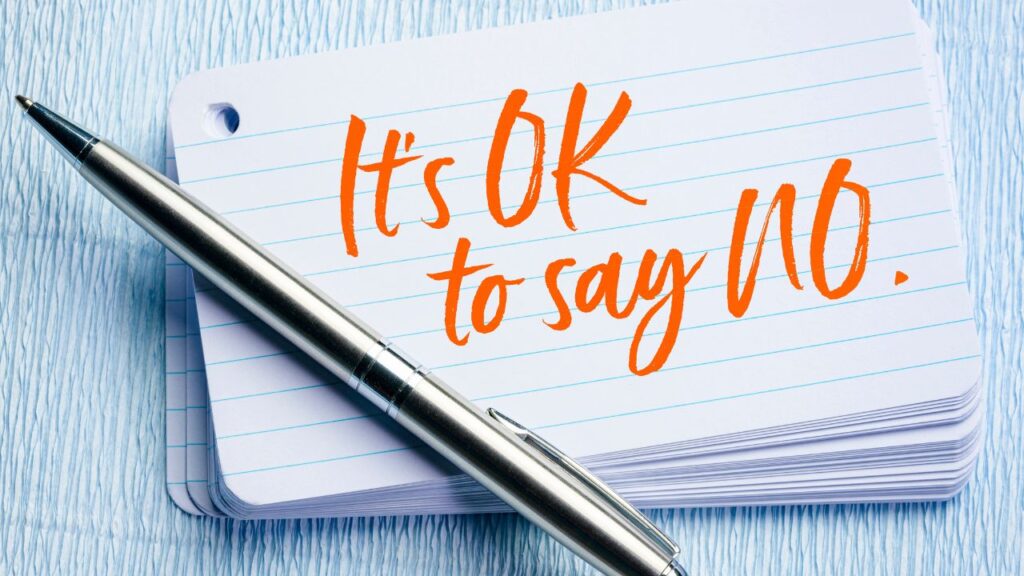How To Say NO & Get Your Life Back
Ever find yourself nodding along to a request when you really want to say no?
You’re not alone. Saying no seems like it should be a straightforward task, but for many of us, it’s a real challenge.
Whether it’s refusing extra work, skipping a social event, or setting personal boundaries, the simple act of saying no often comes with a heavy dose of difficulty.

Let’s break it down together and explore why this tiny word carries such weight. We’ll dig into the everyday reasons behind our hesitation – from the fear of disappointing others to the pressure to always be agreeable.
Join us in unraveling the common struggles that make saying no feel like a Herculean task.
It’s time to decode the reasons behind our reluctance and discover how embracing the power of no can lead to a more balanced and fulfilling life.
Welcome to an honest discussion about the real reasons we find it so hard to say no.
Why it is so hard to say no
Saying no can be tough because we often want to make others happy and avoid conflicts. Society tends to praise being busy, making it feel like we should say yes to everything. Additionally, the fear of seeming selfish or disappointing others can make declining requests challenging.

How to say no
1. Direct and Clear:
- I appreciate the offer, but I have to decline.
- Thank you for thinking of me, but I can’t commit to that right now.
2. Offer an Alternative:
- I can’t make it to the event, but I’d love to catch up another time.
- I can’t take on this project, but I can help you find someone who might be available.
3. Express Prior Commitments:
- I have other plans already, but I appreciate the invitation.
- I’m currently working on another project and can’t take on additional tasks.
4. Use a Soft “No”:
- I’m not sure if I can make it, but I’ll let you know.
- I’ll have to check my schedule and get back to you.

5. External Factors:
- My schedule is pretty hectic right now, and I won’t be able to commit.
- I have a prior engagement and won’t be available.
6. Express Your Limitations:
- I’ve reached my capacity for now and can’t take on more responsibilities.
- I need to focus on my current priorities and can’t add anything else.
7. Be Honest and Assertive:
- I need to prioritize self-care right now, so I can’t take on any additional tasks.
- I appreciate the opportunity, but I have to decline to maintain my work-life balance.
8. Set Boundaries:
- I’ve learned to set boundaries for my well-being, and I can’t say yes to this request.
- I’ve committed to limiting my extra commitments, so I won’t be able to participate.
9. Use Humor:
- I’d love to, but I haven’t figured out how to clone myself yet!
- I’m trying to master the art of saying no – still a work in progress!
10. Combine Gratitude and Refusal:
- I’m grateful for the opportunity, but unfortunately, I have to decline.
- Thank you for considering me, but I won’t be able to take part in this.

Why you should sometimes say no
Prioritizing Self-Care:
Saying no allows you to prioritize your well-being by avoiding overcommitment and burnout.
It creates space for essential self-care activities, ensuring you have the energy and resilience needed to navigate life’s demands.
2. Maintaining Work-Life Balance:
Saying no helps maintain a healthy balance between work and personal life.
It prevents excessive workloads or social obligations from encroaching on your personal time, fostering a more sustainable and fulfilling lifestyle.

3. Respecting Personal Boundaries:
Saying no establishes and reinforces personal boundaries, preventing others from overstepping or taking advantage.
It communicates your limits and cultivates mutual respect in relationships, both personally and professionally.
4. Focusing on Priorities:
Saying no allows you to stay focused on your priorities and long-term goals.
By declining non-essential commitments, you can channel your time and energy towards activities that align with your values and objectives.
5. Preserving Mental and Emotional Health:
Saying no protects your mental and emotional well-being by avoiding unnecessary stress and overwhelm.
It enables you to manage your emotional energy effectively, reducing the risk of anxiety, resentment, or feelings of being stretched too thin.
6. Encouraging Personal Growth:
Saying no creates opportunities for personal growth and skill development.
It allows you to select commitments that challenge and nurture your abilities, contributing to a more intentional and fulfilling personal and professional journey.

7. Promoting Effective Communication:
Saying no fosters open and honest communication. It encourages transparent dialogue about your capacity, preventing misunderstandings and building stronger, more authentic connections with others.
8. Avoiding burnout:
Saying no guards against overloading, helping you avoid spreading yourself too thin.
This ensures that you can fulfill your existing commitments with excellence rather than diluting your efforts across numerous obligations.
9. Cultivating Respect for Your Time:
Saying no communicates the value of your time. It underscores the importance of utilizing your time wisely and not succumbing to external pressures that might divert your attention from essential tasks or personal pursuits.
10. Creating Space for Reflection:
Saying no provides valuable moments for self-reflection. It allows you to assess your priorities, reassess goals, and make intentional decisions about how you invest your time and energy, contributing to a more purposeful and meaningful life.

Thank you for taking the time to read! I appreciate your attention and hope you found valuable insights in our exploration.
If you have any thoughts to share or topics you’d like us to cover in the future, feel free to leave a comment. Your engagement means the world. Until next time, thank you and take care!






